Business Economics Assignment: Food Waste Market Failure and Policies
VerifiedAdded on 2023/04/08
|11
|2019
|458
Homework Assignment
AI Summary
This assignment examines the issue of food waste in Malaysia through the lens of business economics, specifically focusing on market failure. The student identifies the causes of market failure, including information asymmetry and negative externalities associated with food waste disposal, such as methane generation and landfill issues. The assignment provides an overview of current policies implemented by the Malaysian government to address food waste, including the National Strategic Plan and various legislative initiatives. Furthermore, the student recommends additional policies to reduce market failure, such as organic waste bans, mandatory recycling laws, infrastructure development, pricing strategies, taxation, subsidies, and public awareness campaigns. The assignment concludes by emphasizing the need for comprehensive strategies involving government intervention to mitigate the economic and environmental impacts of food waste.
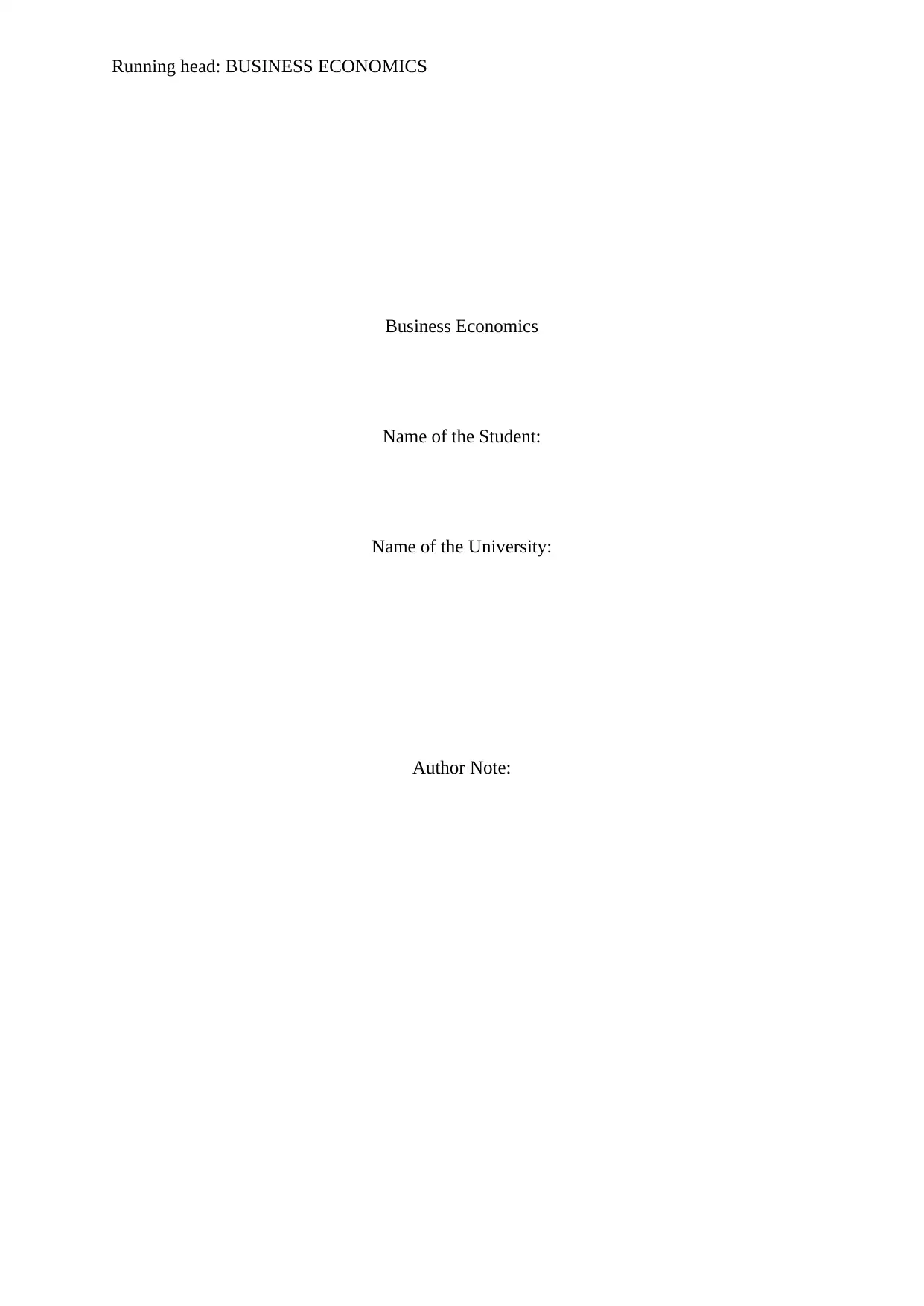
Running head: BUSINESS ECONOMICS
Business Economics
Name of the Student:
Name of the University:
Author Note:
Business Economics
Name of the Student:
Name of the University:
Author Note:
Paraphrase This Document
Need a fresh take? Get an instant paraphrase of this document with our AI Paraphraser
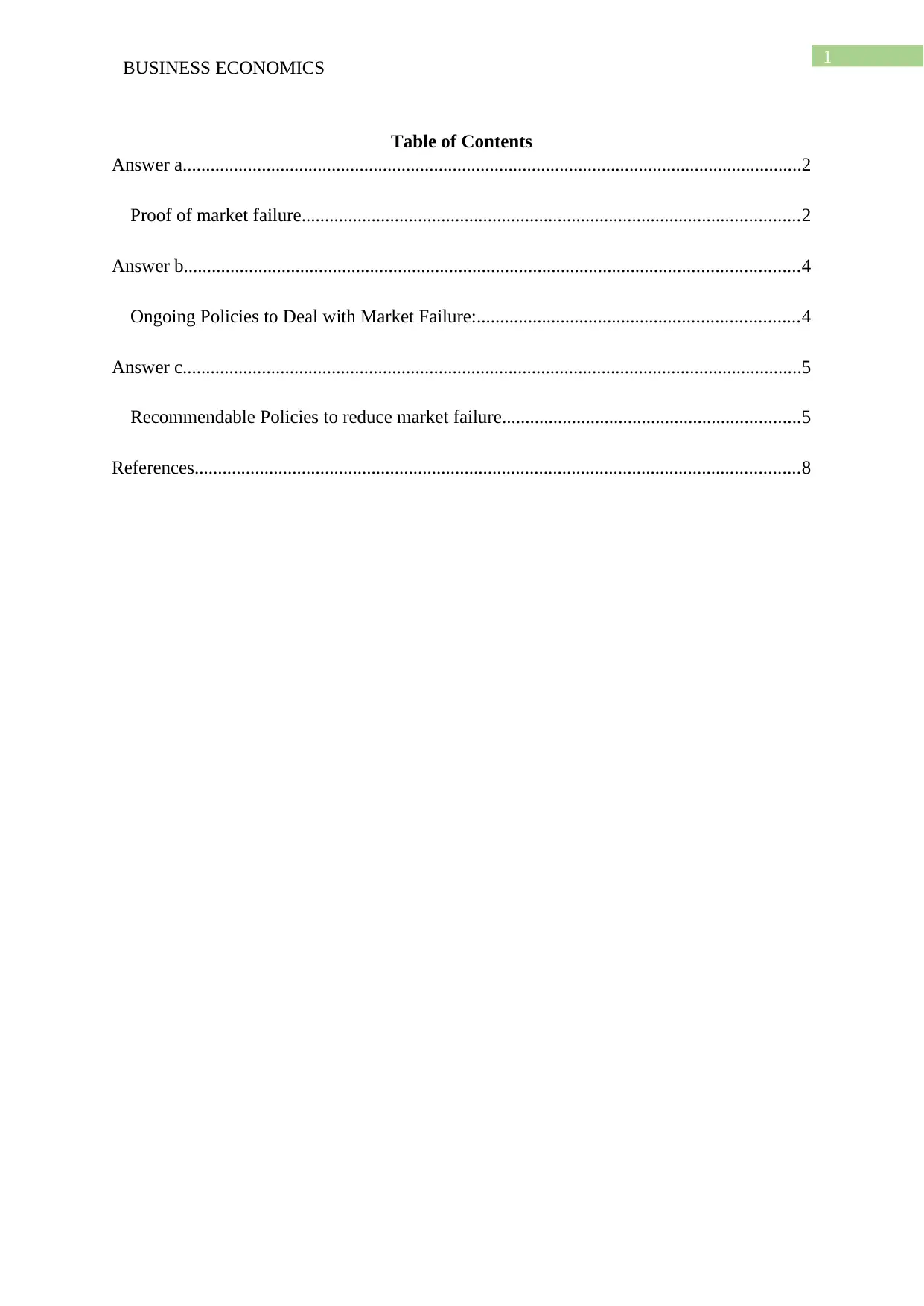
1
BUSINESS ECONOMICS
Table of Contents
Answer a.....................................................................................................................................2
Proof of market failure...........................................................................................................2
Answer b....................................................................................................................................4
Ongoing Policies to Deal with Market Failure:.....................................................................4
Answer c.....................................................................................................................................5
Recommendable Policies to reduce market failure................................................................5
References..................................................................................................................................8
BUSINESS ECONOMICS
Table of Contents
Answer a.....................................................................................................................................2
Proof of market failure...........................................................................................................2
Answer b....................................................................................................................................4
Ongoing Policies to Deal with Market Failure:.....................................................................4
Answer c.....................................................................................................................................5
Recommendable Policies to reduce market failure................................................................5
References..................................................................................................................................8
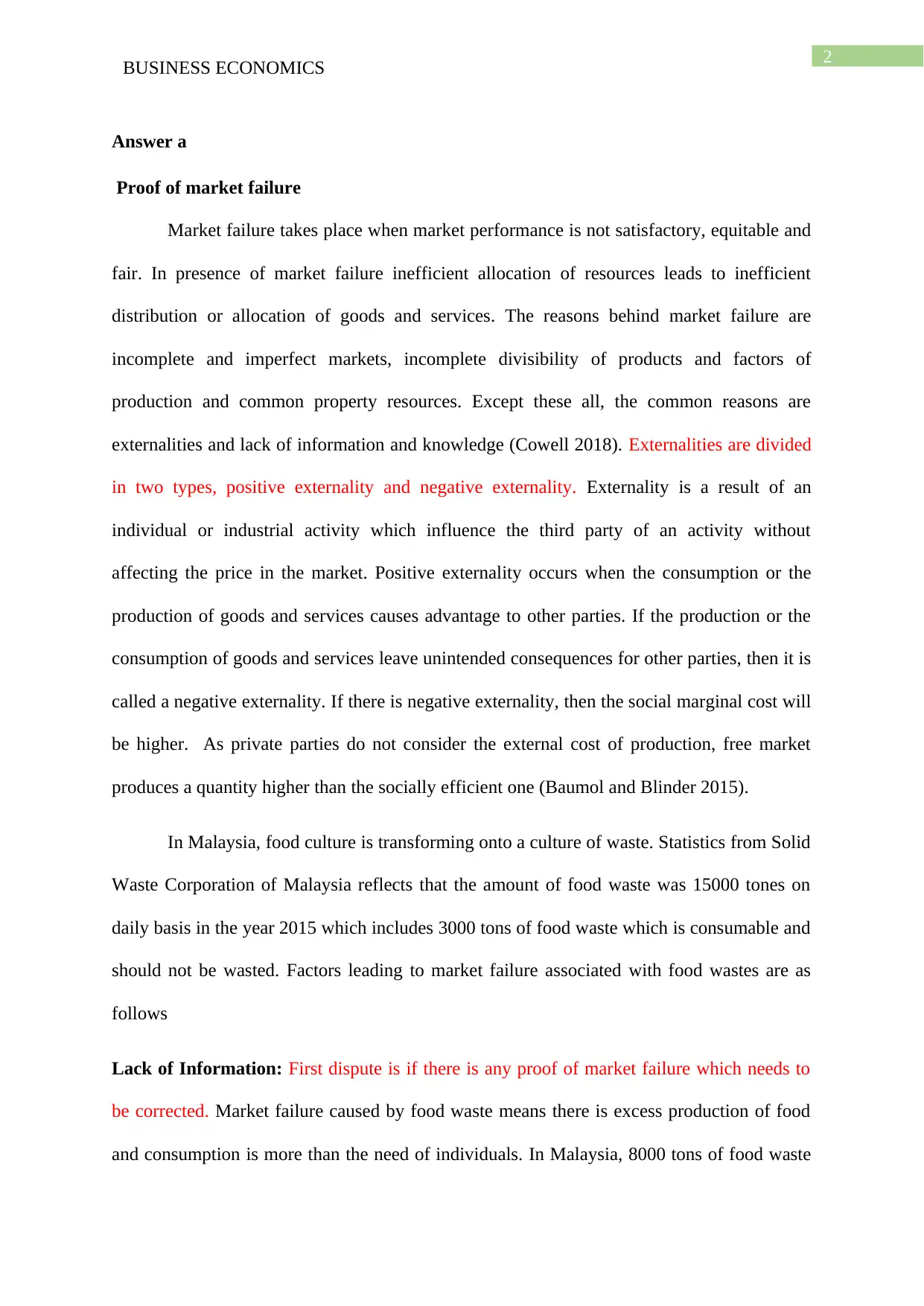
2
BUSINESS ECONOMICS
Answer a
Proof of market failure
Market failure takes place when market performance is not satisfactory, equitable and
fair. In presence of market failure inefficient allocation of resources leads to inefficient
distribution or allocation of goods and services. The reasons behind market failure are
incomplete and imperfect markets, incomplete divisibility of products and factors of
production and common property resources. Except these all, the common reasons are
externalities and lack of information and knowledge (Cowell 2018). Externalities are divided
in two types, positive externality and negative externality. Externality is a result of an
individual or industrial activity which influence the third party of an activity without
affecting the price in the market. Positive externality occurs when the consumption or the
production of goods and services causes advantage to other parties. If the production or the
consumption of goods and services leave unintended consequences for other parties, then it is
called a negative externality. If there is negative externality, then the social marginal cost will
be higher. As private parties do not consider the external cost of production, free market
produces a quantity higher than the socially efficient one (Baumol and Blinder 2015).
In Malaysia, food culture is transforming onto a culture of waste. Statistics from Solid
Waste Corporation of Malaysia reflects that the amount of food waste was 15000 tones on
daily basis in the year 2015 which includes 3000 tons of food waste which is consumable and
should not be wasted. Factors leading to market failure associated with food wastes are as
follows
Lack of Information: First dispute is if there is any proof of market failure which needs to
be corrected. Market failure caused by food waste means there is excess production of food
and consumption is more than the need of individuals. In Malaysia, 8000 tons of food waste
BUSINESS ECONOMICS
Answer a
Proof of market failure
Market failure takes place when market performance is not satisfactory, equitable and
fair. In presence of market failure inefficient allocation of resources leads to inefficient
distribution or allocation of goods and services. The reasons behind market failure are
incomplete and imperfect markets, incomplete divisibility of products and factors of
production and common property resources. Except these all, the common reasons are
externalities and lack of information and knowledge (Cowell 2018). Externalities are divided
in two types, positive externality and negative externality. Externality is a result of an
individual or industrial activity which influence the third party of an activity without
affecting the price in the market. Positive externality occurs when the consumption or the
production of goods and services causes advantage to other parties. If the production or the
consumption of goods and services leave unintended consequences for other parties, then it is
called a negative externality. If there is negative externality, then the social marginal cost will
be higher. As private parties do not consider the external cost of production, free market
produces a quantity higher than the socially efficient one (Baumol and Blinder 2015).
In Malaysia, food culture is transforming onto a culture of waste. Statistics from Solid
Waste Corporation of Malaysia reflects that the amount of food waste was 15000 tones on
daily basis in the year 2015 which includes 3000 tons of food waste which is consumable and
should not be wasted. Factors leading to market failure associated with food wastes are as
follows
Lack of Information: First dispute is if there is any proof of market failure which needs to
be corrected. Market failure caused by food waste means there is excess production of food
and consumption is more than the need of individuals. In Malaysia, 8000 tons of food waste
⊘ This is a preview!⊘
Do you want full access?
Subscribe today to unlock all pages.

Trusted by 1+ million students worldwide
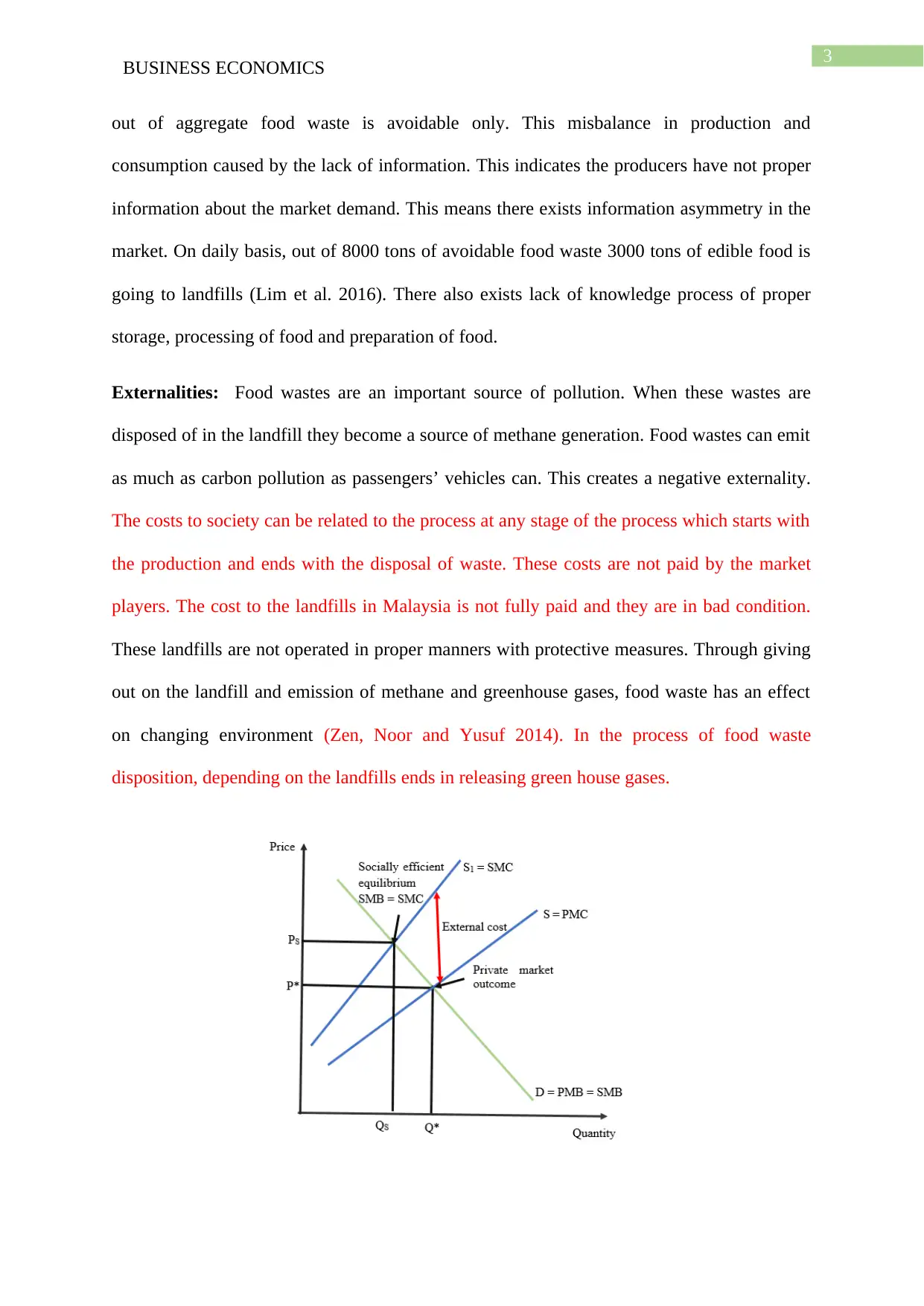
3
BUSINESS ECONOMICS
out of aggregate food waste is avoidable only. This misbalance in production and
consumption caused by the lack of information. This indicates the producers have not proper
information about the market demand. This means there exists information asymmetry in the
market. On daily basis, out of 8000 tons of avoidable food waste 3000 tons of edible food is
going to landfills (Lim et al. 2016). There also exists lack of knowledge process of proper
storage, processing of food and preparation of food.
Externalities: Food wastes are an important source of pollution. When these wastes are
disposed of in the landfill they become a source of methane generation. Food wastes can emit
as much as carbon pollution as passengers’ vehicles can. This creates a negative externality.
The costs to society can be related to the process at any stage of the process which starts with
the production and ends with the disposal of waste. These costs are not paid by the market
players. The cost to the landfills in Malaysia is not fully paid and they are in bad condition.
These landfills are not operated in proper manners with protective measures. Through giving
out on the landfill and emission of methane and greenhouse gases, food waste has an effect
on changing environment (Zen, Noor and Yusuf 2014). In the process of food waste
disposition, depending on the landfills ends in releasing green house gases.
BUSINESS ECONOMICS
out of aggregate food waste is avoidable only. This misbalance in production and
consumption caused by the lack of information. This indicates the producers have not proper
information about the market demand. This means there exists information asymmetry in the
market. On daily basis, out of 8000 tons of avoidable food waste 3000 tons of edible food is
going to landfills (Lim et al. 2016). There also exists lack of knowledge process of proper
storage, processing of food and preparation of food.
Externalities: Food wastes are an important source of pollution. When these wastes are
disposed of in the landfill they become a source of methane generation. Food wastes can emit
as much as carbon pollution as passengers’ vehicles can. This creates a negative externality.
The costs to society can be related to the process at any stage of the process which starts with
the production and ends with the disposal of waste. These costs are not paid by the market
players. The cost to the landfills in Malaysia is not fully paid and they are in bad condition.
These landfills are not operated in proper manners with protective measures. Through giving
out on the landfill and emission of methane and greenhouse gases, food waste has an effect
on changing environment (Zen, Noor and Yusuf 2014). In the process of food waste
disposition, depending on the landfills ends in releasing green house gases.
Paraphrase This Document
Need a fresh take? Get an instant paraphrase of this document with our AI Paraphraser
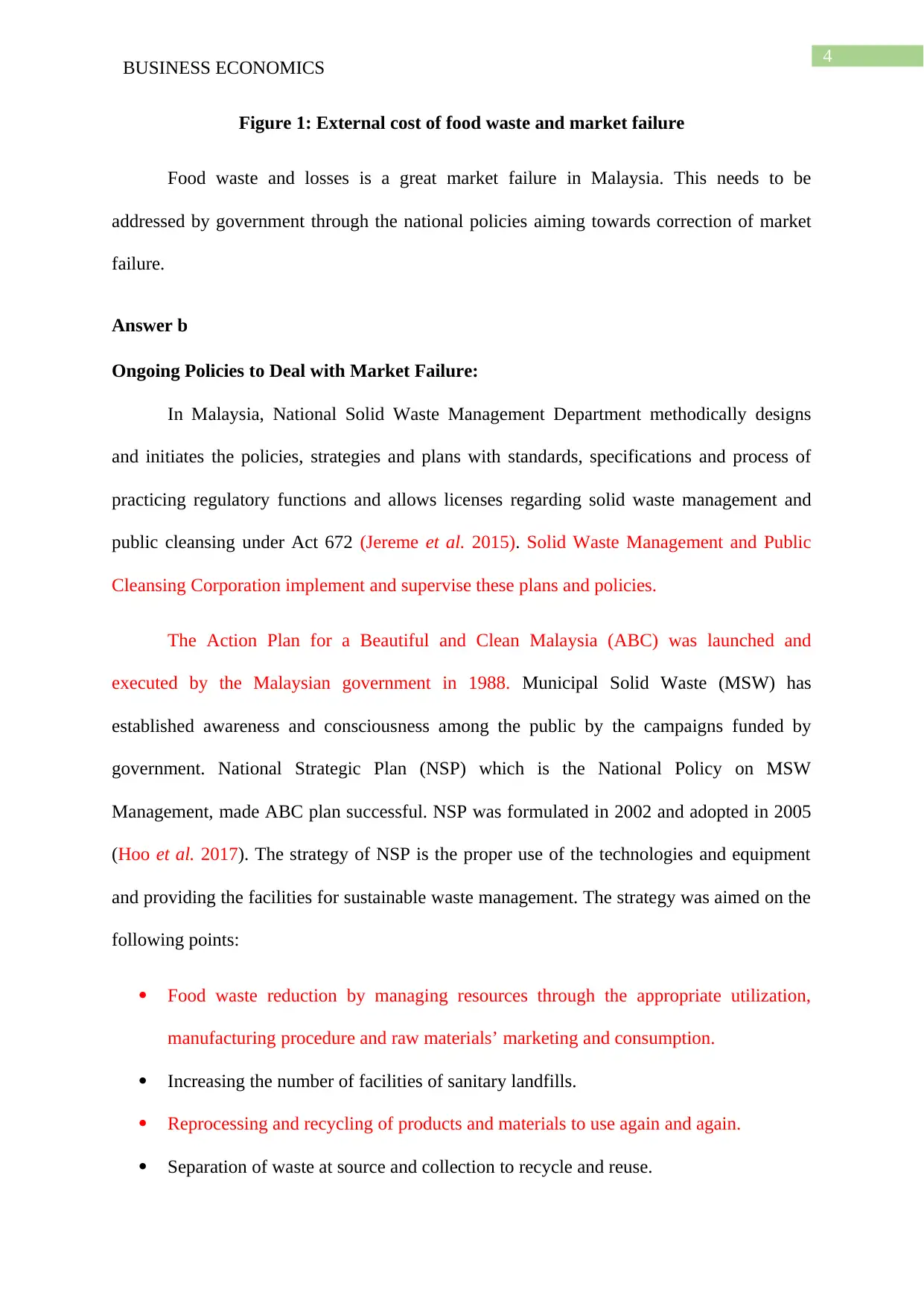
4
BUSINESS ECONOMICS
Figure 1: External cost of food waste and market failure
Food waste and losses is a great market failure in Malaysia. This needs to be
addressed by government through the national policies aiming towards correction of market
failure.
Answer b
Ongoing Policies to Deal with Market Failure:
In Malaysia, National Solid Waste Management Department methodically designs
and initiates the policies, strategies and plans with standards, specifications and process of
practicing regulatory functions and allows licenses regarding solid waste management and
public cleansing under Act 672 (Jereme et al. 2015). Solid Waste Management and Public
Cleansing Corporation implement and supervise these plans and policies.
The Action Plan for a Beautiful and Clean Malaysia (ABC) was launched and
executed by the Malaysian government in 1988. Municipal Solid Waste (MSW) has
established awareness and consciousness among the public by the campaigns funded by
government. National Strategic Plan (NSP) which is the National Policy on MSW
Management, made ABC plan successful. NSP was formulated in 2002 and adopted in 2005
(Hoo et al. 2017). The strategy of NSP is the proper use of the technologies and equipment
and providing the facilities for sustainable waste management. The strategy was aimed on the
following points:
Food waste reduction by managing resources through the appropriate utilization,
manufacturing procedure and raw materials’ marketing and consumption.
Increasing the number of facilities of sanitary landfills.
Reprocessing and recycling of products and materials to use again and again.
Separation of waste at source and collection to recycle and reuse.
BUSINESS ECONOMICS
Figure 1: External cost of food waste and market failure
Food waste and losses is a great market failure in Malaysia. This needs to be
addressed by government through the national policies aiming towards correction of market
failure.
Answer b
Ongoing Policies to Deal with Market Failure:
In Malaysia, National Solid Waste Management Department methodically designs
and initiates the policies, strategies and plans with standards, specifications and process of
practicing regulatory functions and allows licenses regarding solid waste management and
public cleansing under Act 672 (Jereme et al. 2015). Solid Waste Management and Public
Cleansing Corporation implement and supervise these plans and policies.
The Action Plan for a Beautiful and Clean Malaysia (ABC) was launched and
executed by the Malaysian government in 1988. Municipal Solid Waste (MSW) has
established awareness and consciousness among the public by the campaigns funded by
government. National Strategic Plan (NSP) which is the National Policy on MSW
Management, made ABC plan successful. NSP was formulated in 2002 and adopted in 2005
(Hoo et al. 2017). The strategy of NSP is the proper use of the technologies and equipment
and providing the facilities for sustainable waste management. The strategy was aimed on the
following points:
Food waste reduction by managing resources through the appropriate utilization,
manufacturing procedure and raw materials’ marketing and consumption.
Increasing the number of facilities of sanitary landfills.
Reprocessing and recycling of products and materials to use again and again.
Separation of waste at source and collection to recycle and reuse.
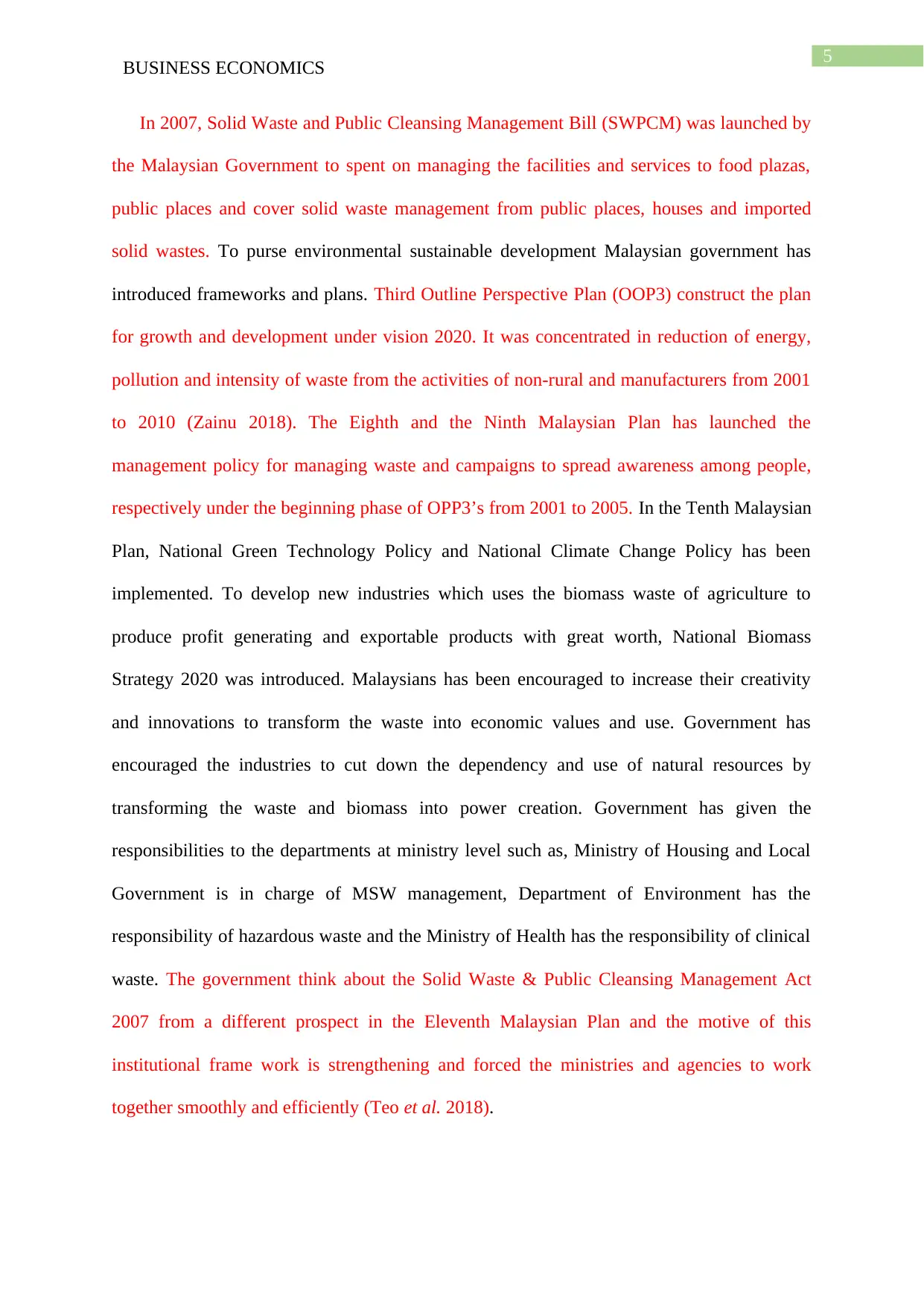
5
BUSINESS ECONOMICS
In 2007, Solid Waste and Public Cleansing Management Bill (SWPCM) was launched by
the Malaysian Government to spent on managing the facilities and services to food plazas,
public places and cover solid waste management from public places, houses and imported
solid wastes. To purse environmental sustainable development Malaysian government has
introduced frameworks and plans. Third Outline Perspective Plan (OOP3) construct the plan
for growth and development under vision 2020. It was concentrated in reduction of energy,
pollution and intensity of waste from the activities of non-rural and manufacturers from 2001
to 2010 (Zainu 2018). The Eighth and the Ninth Malaysian Plan has launched the
management policy for managing waste and campaigns to spread awareness among people,
respectively under the beginning phase of OPP3’s from 2001 to 2005. In the Tenth Malaysian
Plan, National Green Technology Policy and National Climate Change Policy has been
implemented. To develop new industries which uses the biomass waste of agriculture to
produce profit generating and exportable products with great worth, National Biomass
Strategy 2020 was introduced. Malaysians has been encouraged to increase their creativity
and innovations to transform the waste into economic values and use. Government has
encouraged the industries to cut down the dependency and use of natural resources by
transforming the waste and biomass into power creation. Government has given the
responsibilities to the departments at ministry level such as, Ministry of Housing and Local
Government is in charge of MSW management, Department of Environment has the
responsibility of hazardous waste and the Ministry of Health has the responsibility of clinical
waste. The government think about the Solid Waste & Public Cleansing Management Act
2007 from a different prospect in the Eleventh Malaysian Plan and the motive of this
institutional frame work is strengthening and forced the ministries and agencies to work
together smoothly and efficiently (Teo et al. 2018).
BUSINESS ECONOMICS
In 2007, Solid Waste and Public Cleansing Management Bill (SWPCM) was launched by
the Malaysian Government to spent on managing the facilities and services to food plazas,
public places and cover solid waste management from public places, houses and imported
solid wastes. To purse environmental sustainable development Malaysian government has
introduced frameworks and plans. Third Outline Perspective Plan (OOP3) construct the plan
for growth and development under vision 2020. It was concentrated in reduction of energy,
pollution and intensity of waste from the activities of non-rural and manufacturers from 2001
to 2010 (Zainu 2018). The Eighth and the Ninth Malaysian Plan has launched the
management policy for managing waste and campaigns to spread awareness among people,
respectively under the beginning phase of OPP3’s from 2001 to 2005. In the Tenth Malaysian
Plan, National Green Technology Policy and National Climate Change Policy has been
implemented. To develop new industries which uses the biomass waste of agriculture to
produce profit generating and exportable products with great worth, National Biomass
Strategy 2020 was introduced. Malaysians has been encouraged to increase their creativity
and innovations to transform the waste into economic values and use. Government has
encouraged the industries to cut down the dependency and use of natural resources by
transforming the waste and biomass into power creation. Government has given the
responsibilities to the departments at ministry level such as, Ministry of Housing and Local
Government is in charge of MSW management, Department of Environment has the
responsibility of hazardous waste and the Ministry of Health has the responsibility of clinical
waste. The government think about the Solid Waste & Public Cleansing Management Act
2007 from a different prospect in the Eleventh Malaysian Plan and the motive of this
institutional frame work is strengthening and forced the ministries and agencies to work
together smoothly and efficiently (Teo et al. 2018).
⊘ This is a preview!⊘
Do you want full access?
Subscribe today to unlock all pages.

Trusted by 1+ million students worldwide
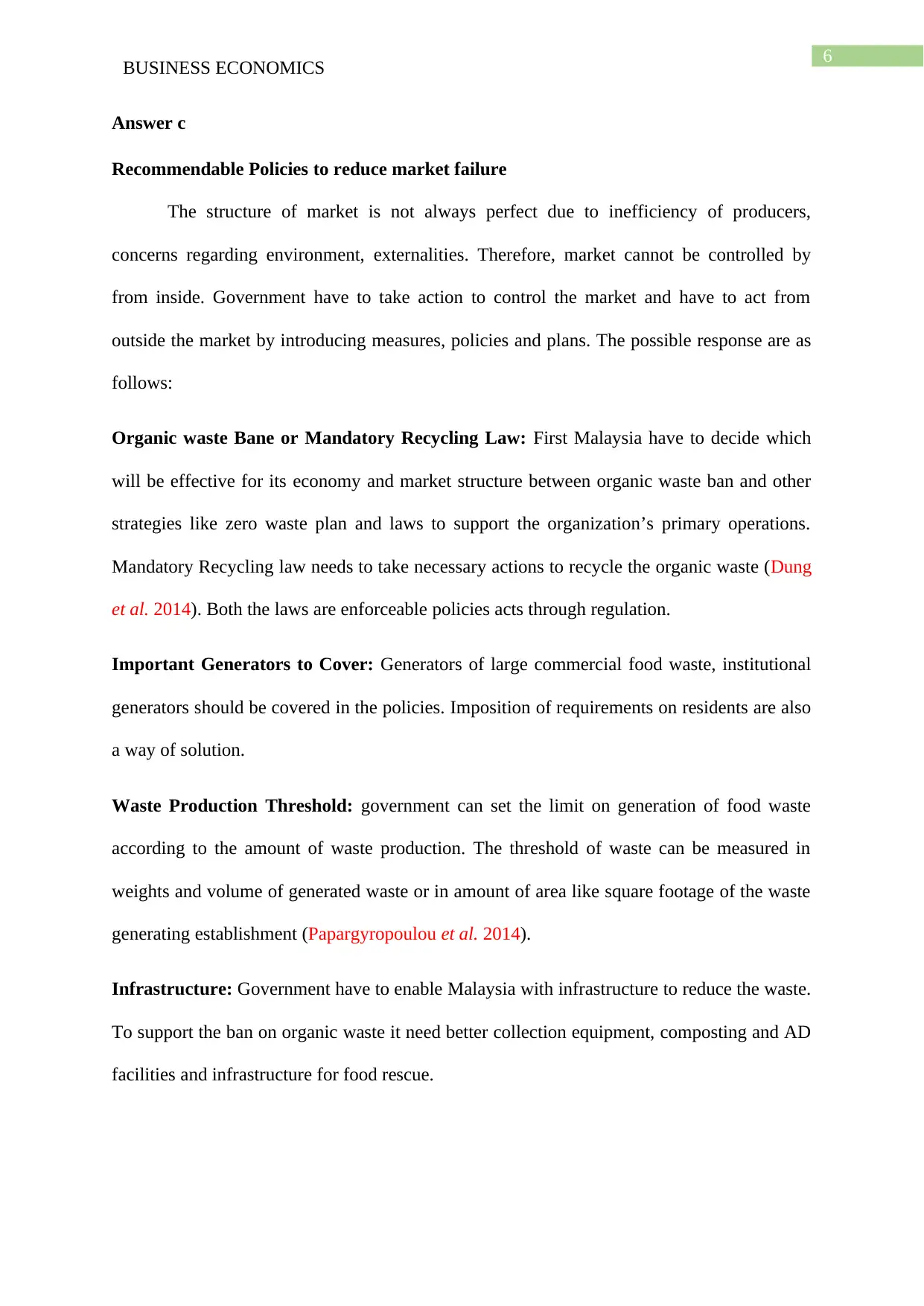
6
BUSINESS ECONOMICS
Answer c
Recommendable Policies to reduce market failure
The structure of market is not always perfect due to inefficiency of producers,
concerns regarding environment, externalities. Therefore, market cannot be controlled by
from inside. Government have to take action to control the market and have to act from
outside the market by introducing measures, policies and plans. The possible response are as
follows:
Organic waste Bane or Mandatory Recycling Law: First Malaysia have to decide which
will be effective for its economy and market structure between organic waste ban and other
strategies like zero waste plan and laws to support the organization’s primary operations.
Mandatory Recycling law needs to take necessary actions to recycle the organic waste (Dung
et al. 2014). Both the laws are enforceable policies acts through regulation.
Important Generators to Cover: Generators of large commercial food waste, institutional
generators should be covered in the policies. Imposition of requirements on residents are also
a way of solution.
Waste Production Threshold: government can set the limit on generation of food waste
according to the amount of waste production. The threshold of waste can be measured in
weights and volume of generated waste or in amount of area like square footage of the waste
generating establishment (Papargyropoulou et al. 2014).
Infrastructure: Government have to enable Malaysia with infrastructure to reduce the waste.
To support the ban on organic waste it need better collection equipment, composting and AD
facilities and infrastructure for food rescue.
BUSINESS ECONOMICS
Answer c
Recommendable Policies to reduce market failure
The structure of market is not always perfect due to inefficiency of producers,
concerns regarding environment, externalities. Therefore, market cannot be controlled by
from inside. Government have to take action to control the market and have to act from
outside the market by introducing measures, policies and plans. The possible response are as
follows:
Organic waste Bane or Mandatory Recycling Law: First Malaysia have to decide which
will be effective for its economy and market structure between organic waste ban and other
strategies like zero waste plan and laws to support the organization’s primary operations.
Mandatory Recycling law needs to take necessary actions to recycle the organic waste (Dung
et al. 2014). Both the laws are enforceable policies acts through regulation.
Important Generators to Cover: Generators of large commercial food waste, institutional
generators should be covered in the policies. Imposition of requirements on residents are also
a way of solution.
Waste Production Threshold: government can set the limit on generation of food waste
according to the amount of waste production. The threshold of waste can be measured in
weights and volume of generated waste or in amount of area like square footage of the waste
generating establishment (Papargyropoulou et al. 2014).
Infrastructure: Government have to enable Malaysia with infrastructure to reduce the waste.
To support the ban on organic waste it need better collection equipment, composting and AD
facilities and infrastructure for food rescue.
Paraphrase This Document
Need a fresh take? Get an instant paraphrase of this document with our AI Paraphraser
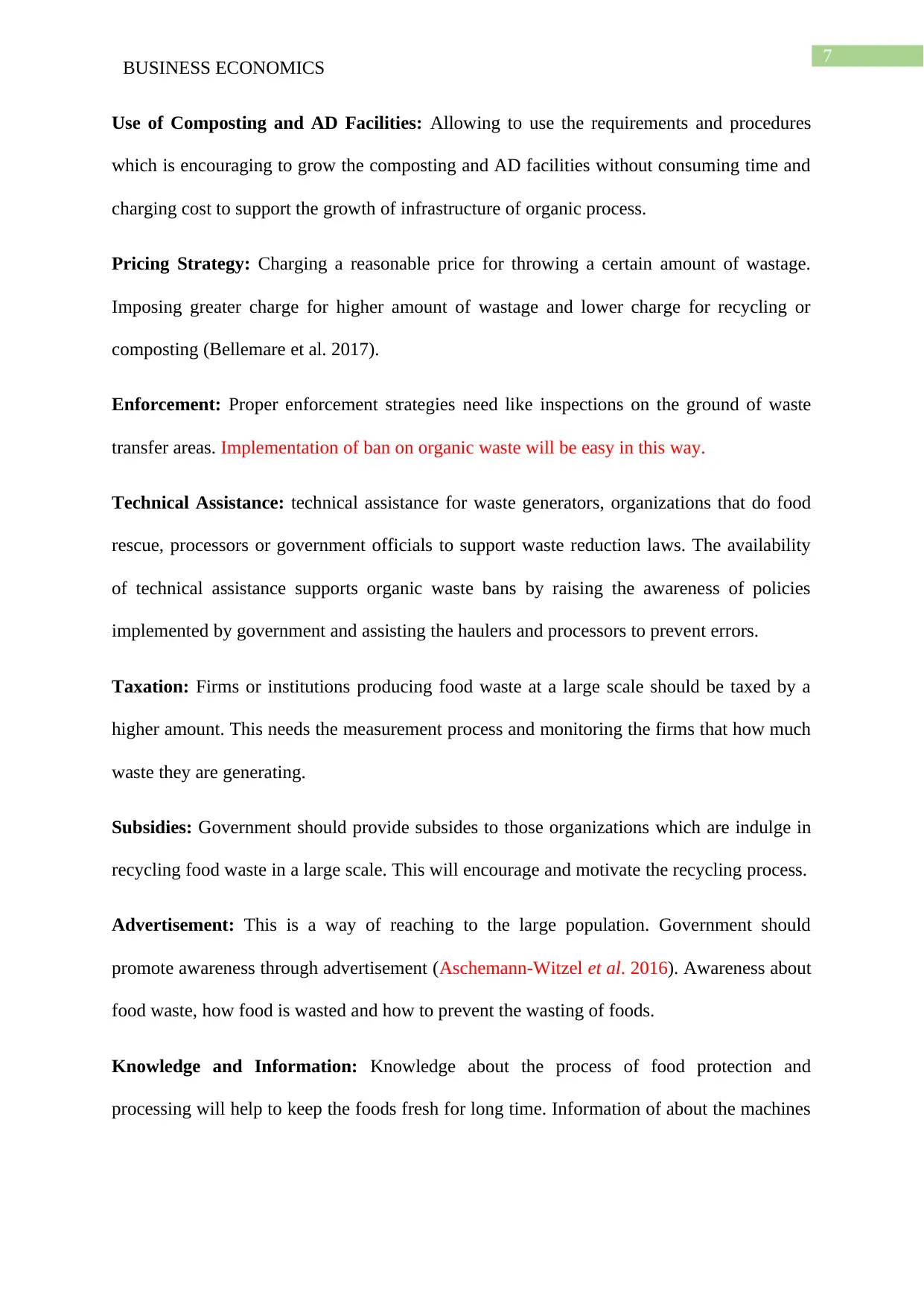
7
BUSINESS ECONOMICS
Use of Composting and AD Facilities: Allowing to use the requirements and procedures
which is encouraging to grow the composting and AD facilities without consuming time and
charging cost to support the growth of infrastructure of organic process.
Pricing Strategy: Charging a reasonable price for throwing a certain amount of wastage.
Imposing greater charge for higher amount of wastage and lower charge for recycling or
composting (Bellemare et al. 2017).
Enforcement: Proper enforcement strategies need like inspections on the ground of waste
transfer areas. Implementation of ban on organic waste will be easy in this way.
Technical Assistance: technical assistance for waste generators, organizations that do food
rescue, processors or government officials to support waste reduction laws. The availability
of technical assistance supports organic waste bans by raising the awareness of policies
implemented by government and assisting the haulers and processors to prevent errors.
Taxation: Firms or institutions producing food waste at a large scale should be taxed by a
higher amount. This needs the measurement process and monitoring the firms that how much
waste they are generating.
Subsidies: Government should provide subsides to those organizations which are indulge in
recycling food waste in a large scale. This will encourage and motivate the recycling process.
Advertisement: This is a way of reaching to the large population. Government should
promote awareness through advertisement (Aschemann-Witzel et al. 2016). Awareness about
food waste, how food is wasted and how to prevent the wasting of foods.
Knowledge and Information: Knowledge about the process of food protection and
processing will help to keep the foods fresh for long time. Information of about the machines
BUSINESS ECONOMICS
Use of Composting and AD Facilities: Allowing to use the requirements and procedures
which is encouraging to grow the composting and AD facilities without consuming time and
charging cost to support the growth of infrastructure of organic process.
Pricing Strategy: Charging a reasonable price for throwing a certain amount of wastage.
Imposing greater charge for higher amount of wastage and lower charge for recycling or
composting (Bellemare et al. 2017).
Enforcement: Proper enforcement strategies need like inspections on the ground of waste
transfer areas. Implementation of ban on organic waste will be easy in this way.
Technical Assistance: technical assistance for waste generators, organizations that do food
rescue, processors or government officials to support waste reduction laws. The availability
of technical assistance supports organic waste bans by raising the awareness of policies
implemented by government and assisting the haulers and processors to prevent errors.
Taxation: Firms or institutions producing food waste at a large scale should be taxed by a
higher amount. This needs the measurement process and monitoring the firms that how much
waste they are generating.
Subsidies: Government should provide subsides to those organizations which are indulge in
recycling food waste in a large scale. This will encourage and motivate the recycling process.
Advertisement: This is a way of reaching to the large population. Government should
promote awareness through advertisement (Aschemann-Witzel et al. 2016). Awareness about
food waste, how food is wasted and how to prevent the wasting of foods.
Knowledge and Information: Knowledge about the process of food protection and
processing will help to keep the foods fresh for long time. Information of about the machines

8
BUSINESS ECONOMICS
which are used to produce foods and protect the foods from wasting, should be spread to the
population.
BUSINESS ECONOMICS
which are used to produce foods and protect the foods from wasting, should be spread to the
population.
⊘ This is a preview!⊘
Do you want full access?
Subscribe today to unlock all pages.

Trusted by 1+ million students worldwide
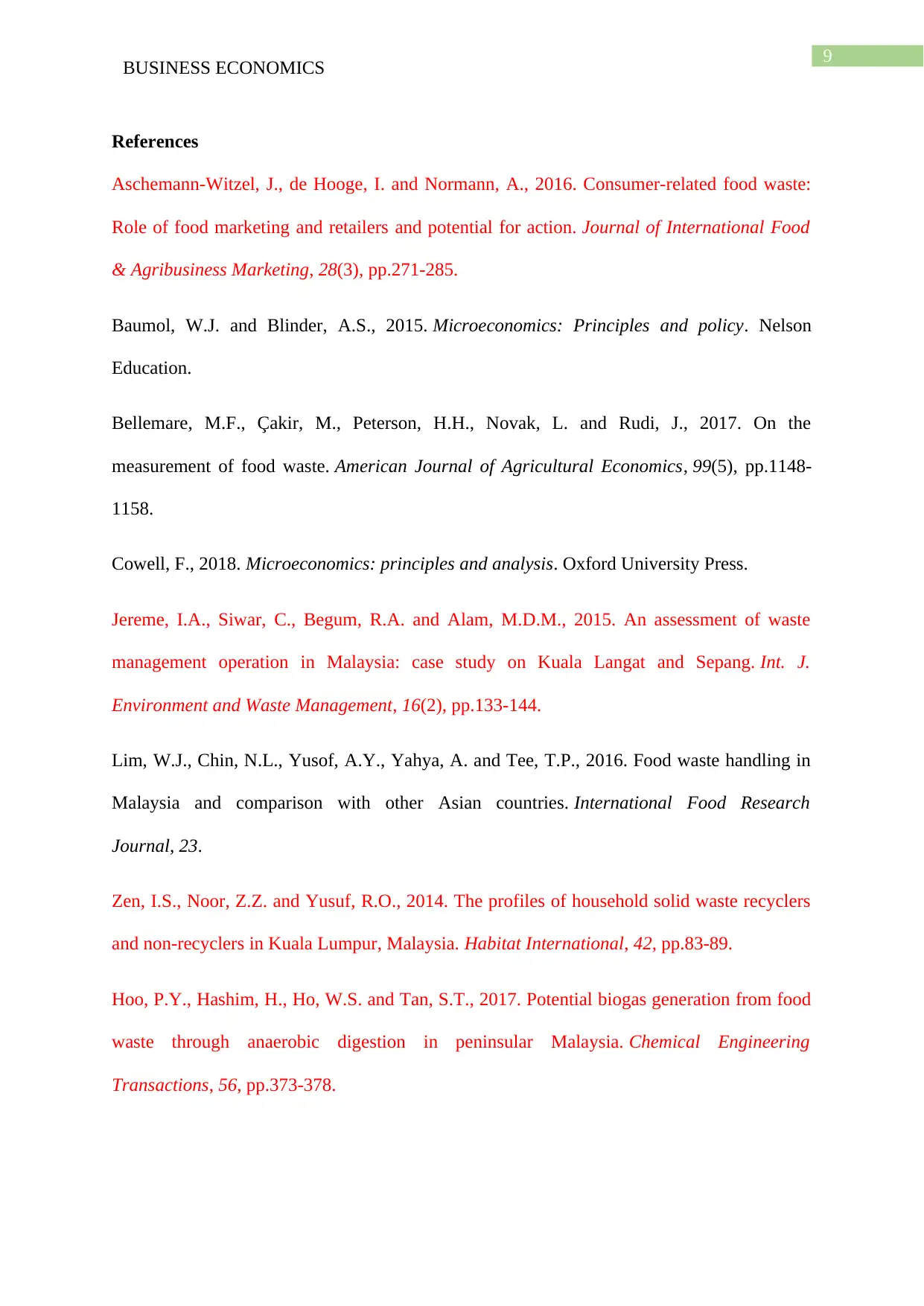
9
BUSINESS ECONOMICS
References
Aschemann-Witzel, J., de Hooge, I. and Normann, A., 2016. Consumer-related food waste:
Role of food marketing and retailers and potential for action. Journal of International Food
& Agribusiness Marketing, 28(3), pp.271-285.
Baumol, W.J. and Blinder, A.S., 2015. Microeconomics: Principles and policy. Nelson
Education.
Bellemare, M.F., Çakir, M., Peterson, H.H., Novak, L. and Rudi, J., 2017. On the
measurement of food waste. American Journal of Agricultural Economics, 99(5), pp.1148-
1158.
Cowell, F., 2018. Microeconomics: principles and analysis. Oxford University Press.
Jereme, I.A., Siwar, C., Begum, R.A. and Alam, M.D.M., 2015. An assessment of waste
management operation in Malaysia: case study on Kuala Langat and Sepang. Int. J.
Environment and Waste Management, 16(2), pp.133-144.
Lim, W.J., Chin, N.L., Yusof, A.Y., Yahya, A. and Tee, T.P., 2016. Food waste handling in
Malaysia and comparison with other Asian countries. International Food Research
Journal, 23.
Zen, I.S., Noor, Z.Z. and Yusuf, R.O., 2014. The profiles of household solid waste recyclers
and non-recyclers in Kuala Lumpur, Malaysia. Habitat International, 42, pp.83-89.
Hoo, P.Y., Hashim, H., Ho, W.S. and Tan, S.T., 2017. Potential biogas generation from food
waste through anaerobic digestion in peninsular Malaysia. Chemical Engineering
Transactions, 56, pp.373-378.
BUSINESS ECONOMICS
References
Aschemann-Witzel, J., de Hooge, I. and Normann, A., 2016. Consumer-related food waste:
Role of food marketing and retailers and potential for action. Journal of International Food
& Agribusiness Marketing, 28(3), pp.271-285.
Baumol, W.J. and Blinder, A.S., 2015. Microeconomics: Principles and policy. Nelson
Education.
Bellemare, M.F., Çakir, M., Peterson, H.H., Novak, L. and Rudi, J., 2017. On the
measurement of food waste. American Journal of Agricultural Economics, 99(5), pp.1148-
1158.
Cowell, F., 2018. Microeconomics: principles and analysis. Oxford University Press.
Jereme, I.A., Siwar, C., Begum, R.A. and Alam, M.D.M., 2015. An assessment of waste
management operation in Malaysia: case study on Kuala Langat and Sepang. Int. J.
Environment and Waste Management, 16(2), pp.133-144.
Lim, W.J., Chin, N.L., Yusof, A.Y., Yahya, A. and Tee, T.P., 2016. Food waste handling in
Malaysia and comparison with other Asian countries. International Food Research
Journal, 23.
Zen, I.S., Noor, Z.Z. and Yusuf, R.O., 2014. The profiles of household solid waste recyclers
and non-recyclers in Kuala Lumpur, Malaysia. Habitat International, 42, pp.83-89.
Hoo, P.Y., Hashim, H., Ho, W.S. and Tan, S.T., 2017. Potential biogas generation from food
waste through anaerobic digestion in peninsular Malaysia. Chemical Engineering
Transactions, 56, pp.373-378.
Paraphrase This Document
Need a fresh take? Get an instant paraphrase of this document with our AI Paraphraser
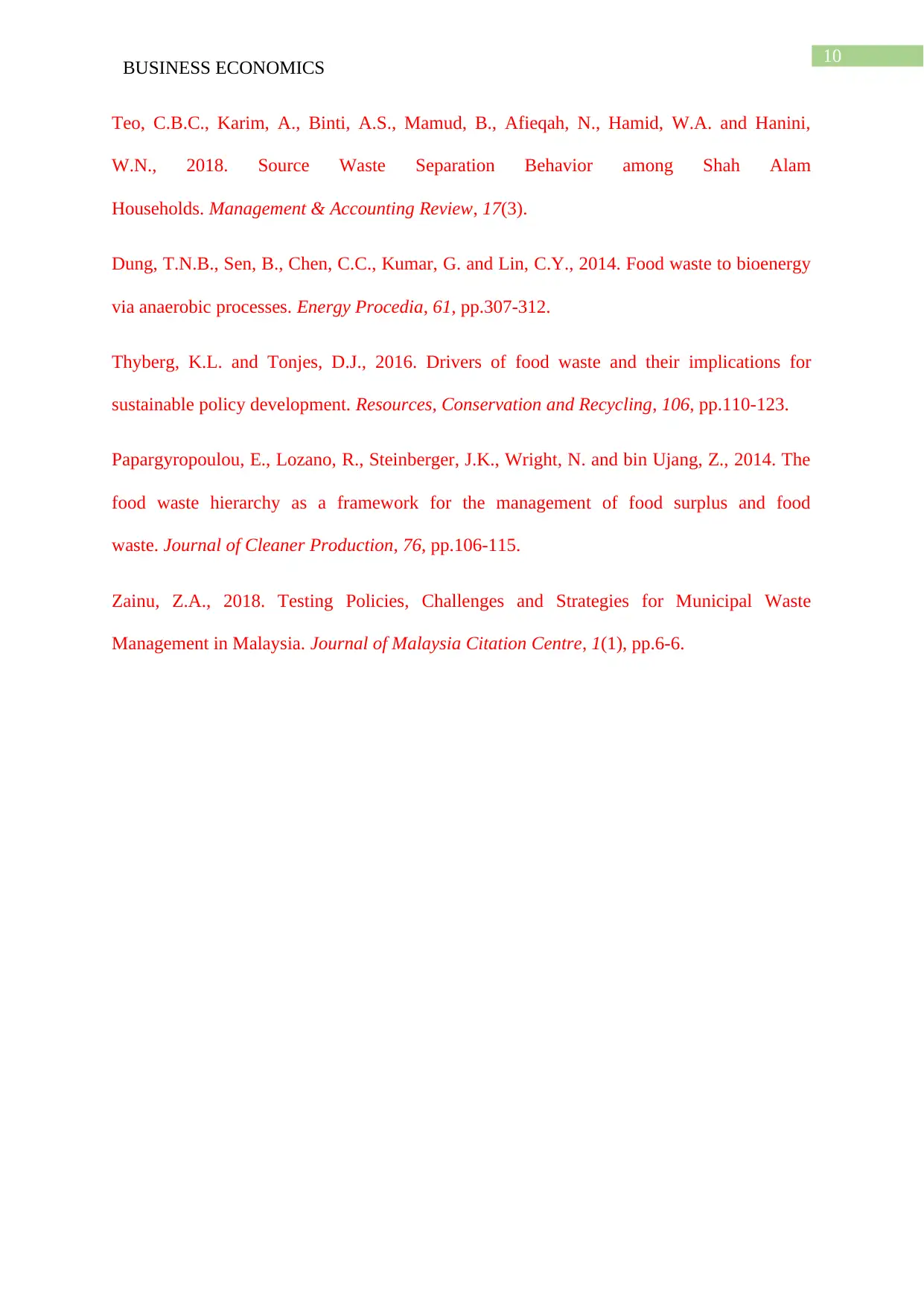
10
BUSINESS ECONOMICS
Teo, C.B.C., Karim, A., Binti, A.S., Mamud, B., Afieqah, N., Hamid, W.A. and Hanini,
W.N., 2018. Source Waste Separation Behavior among Shah Alam
Households. Management & Accounting Review, 17(3).
Dung, T.N.B., Sen, B., Chen, C.C., Kumar, G. and Lin, C.Y., 2014. Food waste to bioenergy
via anaerobic processes. Energy Procedia, 61, pp.307-312.
Thyberg, K.L. and Tonjes, D.J., 2016. Drivers of food waste and their implications for
sustainable policy development. Resources, Conservation and Recycling, 106, pp.110-123.
Papargyropoulou, E., Lozano, R., Steinberger, J.K., Wright, N. and bin Ujang, Z., 2014. The
food waste hierarchy as a framework for the management of food surplus and food
waste. Journal of Cleaner Production, 76, pp.106-115.
Zainu, Z.A., 2018. Testing Policies, Challenges and Strategies for Municipal Waste
Management in Malaysia. Journal of Malaysia Citation Centre, 1(1), pp.6-6.
BUSINESS ECONOMICS
Teo, C.B.C., Karim, A., Binti, A.S., Mamud, B., Afieqah, N., Hamid, W.A. and Hanini,
W.N., 2018. Source Waste Separation Behavior among Shah Alam
Households. Management & Accounting Review, 17(3).
Dung, T.N.B., Sen, B., Chen, C.C., Kumar, G. and Lin, C.Y., 2014. Food waste to bioenergy
via anaerobic processes. Energy Procedia, 61, pp.307-312.
Thyberg, K.L. and Tonjes, D.J., 2016. Drivers of food waste and their implications for
sustainable policy development. Resources, Conservation and Recycling, 106, pp.110-123.
Papargyropoulou, E., Lozano, R., Steinberger, J.K., Wright, N. and bin Ujang, Z., 2014. The
food waste hierarchy as a framework for the management of food surplus and food
waste. Journal of Cleaner Production, 76, pp.106-115.
Zainu, Z.A., 2018. Testing Policies, Challenges and Strategies for Municipal Waste
Management in Malaysia. Journal of Malaysia Citation Centre, 1(1), pp.6-6.
1 out of 11
Related Documents
Your All-in-One AI-Powered Toolkit for Academic Success.
+13062052269
info@desklib.com
Available 24*7 on WhatsApp / Email
![[object Object]](/_next/static/media/star-bottom.7253800d.svg)
Unlock your academic potential
Copyright © 2020–2026 A2Z Services. All Rights Reserved. Developed and managed by ZUCOL.



